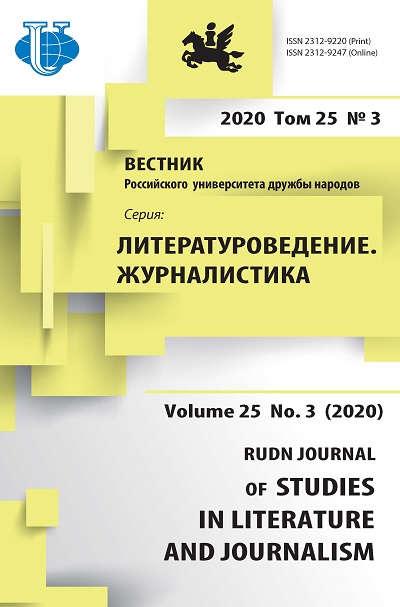Is Germany a “digital outsider”?
- Authors: Gaponova E.M.1
-
Affiliations:
- International Union of German Culture
- Issue: Vol 25, No 3 (2020)
- Pages: 542-553
- Section: JOURNALISM
- URL: https://journals.rudn.ru/literary-criticism/article/view/24830
- DOI: https://doi.org/10.22363/2312-9220-2020-25-3-542-553
- ID: 24830
Cite item
Full Text
Abstract
The article is devoted to digitalization in Germany, taking into account the historical context. The scientific novelty and relevance of the study lies in the fact that the German digital media history is examined against the background of the transformation of the media system, mainly after the reunification of the two German states. The scientific significance of the research results is that the following conflict is presented and resolved. On the one hand, Germany has long been ranked among the countries in which multimedia is actively involved in everyday life, and the problem of “digital divide” (digitale Kluft or digitale Spaltung), which caused heated discussion in the world in the mid-1990s not typical for an economically developed country like Germany. On the other hand, in 2018-2019 scientific publications appeared in which the country was presented as a digital outsider, which means that the federal government’s strategy for the development of information and communication technologies has not been properly developed. The author studies digitalization in Germany in the following aspects: historical, substantial and economic, making an attempt to analyze the current situation.
Keywords
About the authors
Elena M. Gaponova
International Union of German Culture
Author for correspondence.
Email: soz@ivdk.ru
leading manager, candidate for a degree of PhD in Philology
5 Malaya Pirogovskaya St, Moscow, 119435, Russian FederationReferences
- Voronenkova, G.F. (2011). Put' dlinoyu v pyat' stoletij: Ot rukopisnogo listka do informacionnogo obshchestva. Nacional'noe svoeobrazie sredstv massovoj informacii Germanii [A five-hundred-year-long journey: From a handwritten leaflet to the information society. National identity of the German media]. Moscow, Izd-vo Moskovskogo universiteta Publ.
- Emmrich, J. (n.d.). Medien-manager diskutieren mit Politikern ueber Zukunft des Journalismus. Retrieved April 15, 2020, from http://www.derwesten.de/suche/?q=Julia+ EmmrichMedien-manager
- Orekhova, O.E. (2014). Tendencii razvitiya gazetnogo rynka FRG v XXI veke [Trends in the development of the German newspaper market in the 21st century]. Vestnik of Lobachevsky University of Nizhni Novgorod, (2–1), 364–367.
- Fernsehen. Statista. Retrieved April 15, 2020, from https://de.statista.com
- Rost, H. (n.d.). Zehn Thesen zur Zukunft der Zeitung. Retrieved February 10, 2020, from http://www. blog-cj.de/blog/2010/10/21/zehn-thesen-zur-zukunft-derzeitung/
- Die Zeit. (1996, 15 Maerz).
- Rhein-Zeitung. (1997, 8 April).
- Informationen zur politischen Bildung (1998). Bonn. No. 260.
- Germany-Live. (1997, 7 Maerz).
- AGF Videoforschung. Offizielle Website. Retrieved February 10, 2020, from https:// www.agf.de/daten/tvdaten/digitaltv/
- Vartanova, E.L. (2011). Cifrovoe televidenie i transformacii mediasistem. O neobhodimosti mezhdisciplinarnyh podhodov k izucheniyu sovremennogo TV [Digital television and the transformation of media systems. On the need for multidisciplinary approaches to the study of modern TV]. Vestnik Moskovskogo universiteta. Series 10. Zhurnalistika, (4), 6–26.
- Bundesministerium für Wirtschaft und Energie, Bundesministerium des Innern, Bundesministerium für Verkehr und Digitale. (2014, August). Infrastruktur Digitale Agenda 2014–2017. Retrieved April 15, 2020, from https://www.digitale-agenda.de/
- Supyan, N. (2018). Cifrovye celi bol'shoj koalicii [Digital Coalition Goals]. Scientific and Analytical Herald of the Institute of Europe RAS, (2), 159–167.
- Mihajlina, I. (2014). Germaniya vlozhit polmilliarda evro v digitalizaciyu [Germany will invest half a billion euros in digitalization]. Germania-Online. Retrieved February 10, 2020, from http://germania-online.ru/politika/politika-detal/datum/2014/10/24/germanijavlozhit-polmilliarda-evro-v-digitalizaciju.html
- Deutschlands Zukunft gestalten Koalitionsvertrag zwischen CDU, CSU und SPD 18. Legislaturperiode. Retrieved May 3, 2020, from https://www.bundesregierung.de/Content/DE/
- IMD World Digital Competitiveness Ranking 2017. Retrieved May 3, 2020, from https://www.bundesregierung.de/
- Bericht über den Stand der Digitalisierung in Europa 2017 – Länderprofil Deutschland. Shaping Europe’s digital future: Germany. Retrieved May 3, 2020, from https://ec. europa.eu/digital-single-market/en/scoreboard/germany
- Kutikova, G. (n.d.). Internet 5G i cifrovye tekhnologii v kazhdyj dom: Pravitel'stvu Germanii est' nad chem rabotat' [5G Internet and digital technology in every home: The German government has a lot to work on]. Retrieved July 5, 2020, from https:// germania.one/internet-5g-i-cifrovye-tehnologii-v-kazhdyj-dom-pravitelstvu-germanii-est-nad-chem-rabotat/
- Media Perspektiven. Basisdaten. Daten zur Mediensituation in Deutschland 2018. (2019, February). Frankfurt am Main.
- Voronenkova, G.F. (2016). Cifrovoe neravenstvo v paradigme nauchnyh diskussij v Germanii [Digital Inequality in the Paradigm of Scientific Discussion in Germany]. Mediaskop (issue 4). Retrieved May 3, 2020, from http://www.mediascope.ru/2200
Supplementary files















